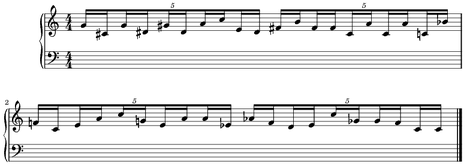|

|
Figure 8.41: Minimum and Maximum Tuplet Durations
You can set the minimum and maximum duration a tuplet is allowed to span with min-tupletdur and max-tupletdur.
They are set here as part of the measure definitions because they can't be set at the note level.
|

|
Figure 8.41: Minimum and Maximum Tuplet Durations
The tup.. and ..tup marks force FOMUS to begin and end a tuplet at those locations, even if it
breaks FOMUS's rules determining where tuplets are allowed to occur.
The example below uses begin marks to force FOMUS to only begin tuplets at those locations.
|

|
Figure 8.42: Tuplet Begin and End Marks
You can also use the tupletdur and tupletrat settings to fix the duration or ratio of the tuplet:
|

|
Figure 8.43: Tuplet Durations
It's best to include tupletdur and tupletrat in all note events that might fall underneath the tuplets.
Specifying these settings in only a single event, for example, might cause FOMUS to overlook them.
This example shows tuplets being explicitly defined using the marks and settings introduced above:
|

|
Figure 8.44: Explicitly Defined Tuplets